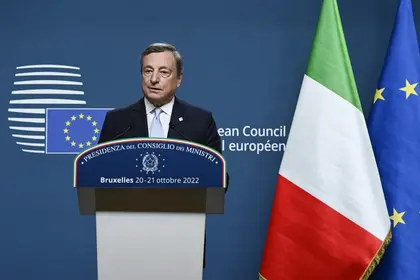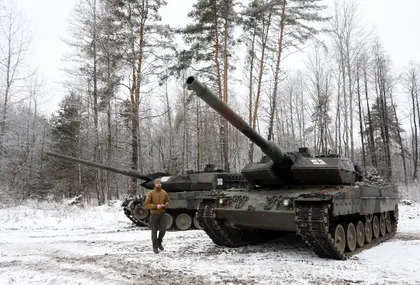Mario Draghi, former Italian Prime Minister and President of the European Central Bank, has made his first major public speech since he resigned as prime minster in October 2022.
Draghi spoke at the Massachusetts Institute of Technology, his alma mater, in Cambridge, Massachusetts on June 7, where he was receiving the Miriam Pozen Prize in recognition of his leadership in international financial policy.
JOIN US ON TELEGRAM
Follow our coverage of the war on the @Kyivpost_official.
His speech addressed, among other topics, Russia’s war against Ukraine.
“Russia’s brutal invasion into Ukraine… was no unpredictable act of folly. It was the premeditated next step of Putin’s agenda and a determined blow to the European Union.”
Draghi, who was a consistently stalwart supporter of Ukraine’s fight against Russia, warned of grave consequences should the EU consider compromising with Moscow, as has been suggested openly by leaders such as Hungary’s Viktor Orbán, and more circumspectly by the likes of France’s Emmanuel Macron.
“The European Union’s existential values are peace, freedom and respect of democratic sovereignty,” Draghi said. “They are the values that emerged after the bloodbath of World War II. And that is why there is no alternative for the US, Europe and its allies to ensuring that Ukraine wins the war.”
Despite Italy’s dependence on Russian gas, economic ties, and its historical sympathy for Moscow, Draghi swam against the current from the beginning and was instrumental in pushing through a military aid package for Kyiv, even in the face of a mutiny from within his own government.

Russian Air Attack Kills Nine in Sumy Region
He visited Kyiv in June 2022 along with French President Emmanuel Macron, German Chancellor Olaf Scholz, and pushed his EU partners to increase support for Ukraine.
From the beginning of the full-scale attack, he was the only leader from any of the EU founding members to insist on fast-tracking Ukraine’s membership bid.
Moreover, Draghi has consistently criticized any thought of compromise with Russia.
“Accepting a Russian victory or a muddled draw would fatally weaken other bordering states and send a message to autocrats that the European Union is ready to compromise on what it stands for,” he said.
“It would also signal to our Eastern partners that our commitment to their freedom and independence, a pillar of our foreign policy, is not so unwavering after all. In short, it would deal an existential blow to the European Union.”
You can also highlight the text and press Ctrl + Enter










